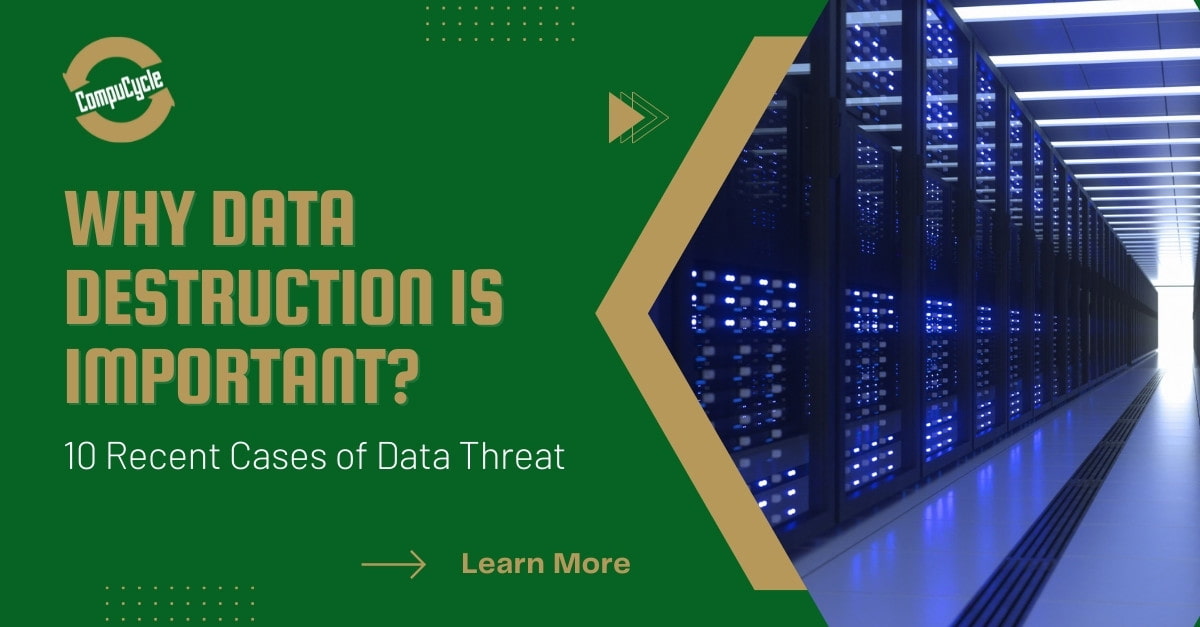Top Tips for Ensuring Secure Data Destruction in Your Cyber Security Plan
Top Tips for Ensuring Secure Data Destruction in Your Cyber Security Plan
Blog Article
Discovering the Relevance of Information Destruction in the Context of Computer System Security Providers and Protecting Confidential Information
In an age where information breaches are increasingly typical, the relevance of efficient data destruction can not be overstated. Organizations must adopt rigorous procedures to make sure that sensitive details is not just protected throughout its lifecycle yet also decisively gotten rid of when no longer necessary. The methods utilized for data obliteration, coupled with compliance to legal criteria, play an essential duty in maintaining privacy and trust. Nonetheless, the ramifications of these methods extend past plain conformity, affecting a company's reputation and operational integrity in the digital industry. What techniques can companies apply to improve their information devastation methods?
Recognizing Information Damage
Information devastation is a critical element of computer system safety that includes the irreversible elimination of information from storage devices to stop unapproved gain access to and potential data violations. In a significantly electronic landscape, organizations encounter enhanced dangers connected with delicate info being incorrectly accessed or manipulated. Effective data devastation safeguards versus these hazards, making sure that personal dataâEUR" such as consumer info, copyright, and monetary recordsâEUR" can not be recouped after disposal.
Comprehending the relevance of information destruction prolongs past mere conformity with legal and regulative frameworks; it is essential for preserving organizational integrity and depend on. When data is incorrectly handled or inadequately destroyed, the effects can be extreme, consisting of financial loss, reputational damages, and legal liabilities.

Methods of Data Eradication

One widespread technique is data cleaning, which includes overwriting existing data with random patterns several times. This technique makes the initial information irretrievable, making it a preferred selection for companies looking for to safeguard secret information.
One more approach is degaussing, which uses a powerful magnetic field to interfere with the magnetic domain names on storage space tools, effectively eliminating the data. This method is specifically efficient for magnetic media however is not suitable to solid-state drives.
Physical devastation is an additional durable technique, crushing or entailing the shredding of storage devices. This approach guarantees that data recovery is basically difficult, making it suitable for highly delicate details.
Last but not least, file encryption can act as a complementary approach to data elimination. By securing information before deletion, organizations can add an additional layer of protection, making certain that also if residues are recuperated, they remain hard to reach without the decryption key. Each approach needs to be picked based upon the level of data level of sensitivity and the particular security demands of the company.
Legal Compliance and Information Safety And Security
Organizations should navigate a complicated landscape of legal requirements connected to data safety and security, especially after applying approaches of data obliteration. Numerous policies, such as the General Data Security Law (GDPR) and the Health And Wellness Insurance Transportability and Accountability Act (HIPAA), enforce rigid standards on how companies should take care of and dispose of delicate data. Failing to abide with these guidelines can bring about significant legal effects, consisting of significant fines and reputational damage.
Data devastation processes must be diligently recorded to demonstrate conformity with appropriate laws and criteria. This paperwork not just serves as proof of adherence to legal obligations but likewise shows a dedication to safeguarding delicate information. Organizations needs to likewise establish clear policies relating to information retention and devastation timelines, making sure that data is not held longer than essential.

In addition, regular audits and assessments of data read devastation techniques are important to keep conformity and adapt to developing lawful frameworks (data destruction). By proactively resolving lawful needs, companies can mitigate dangers connected with data violations and demonstrate their dedication to data safety. Inevitably, focusing on lawful conformity in data damage processes is not simply a regulatory responsibility, however a fundamental facet of a durable information security strategy
Influence On Service Online Reputation
The online reputation of a company can be significantly affected by its strategy to data damage and monitoring. In today's electronic landscape, where data breaches can happen at any kind of minute, the failing to properly throw away delicate details can bring about extreme effects. Organizations that improperly handle information devastation risk subjecting confidential customer info, which not only goes against privacy laws but also deteriorates depend on among stakeholders and customers.
A tarnished track record can result in lowered client commitment, as clients end up being hesitant to engage with a service that has actually shown neglect in securing their data. Adverse attention surrounding an information breach can have a long-term result, as prospective clients could be hindered by the regarded absence of protection. This can lead to a direct decrease in profits and market share.
Additionally, services that focus on data destruction as component of their security strategy can enhance their reputation by showcasing their dedication to securing sensitive details. By taking on rigorous information administration methods, organizations can not just mitigate risks yet likewise place themselves as reliable entities in their corresponding sectors, therefore enhancing their total brand name photo.

Finest Practices for Secure Disposal
Implementing best practices for protected disposal of data is necessary for reducing threats connected with information breaches and guaranteeing compliance with personal privacy policies. Organizations should adopt a detailed data disposal policy that outlines treatments for both digital and physical information destruction.
For physical information storage space tools, such as tough drives, shredding or degaussing is recommended to avoid information great post to read recuperation. In addition, organizations must maintain a chain of guardianship documents during the disposal process, making sure responsibility and traceability of disposed items.
For electronic information, using software that sticks to sector criteria for data wiping is important. This software should overwrite existing data multiple times, making recovery virtually impossible. It is likewise essential to validate the efficiency of the information damage procedure via audits or third-party evaluations.
Training workers on safe and secure disposal techniques includes one more layer of protection, as human mistake can frequently cause information exposure. Frequently updating and reviewing disposal policies ensures positioning with progressing policies and technological developments. By implementing these ideal techniques, companies can substantially decrease the risk of unapproved information accessibility and enhance their general data protection strategy.
Verdict
Finally, data devastation is a basic aspect of computer protection solutions that makes sure the security of secret information from unapproved accessibility. Applying efficient techniques of information obliteration, adhering to legal compliance, and identifying the influence on business online reputation are crucial parts of an extensive information safety and security strategy. By adopting finest methods for protected disposal, companies can cultivate trust with clients and guard delicate data, eventually contributing to a more safe digital landscape.
In an era where data breaches are significantly usual, the value of reliable data damage can not be overstated.Data damage is an essential element of computer system safety that entails the permanent removal of data from storage devices to avoid unauthorized access and possible information breaches. Organizations needs to additionally develop clear plans relating to information retention and damage timelines, making certain that information is not held longer than needed.
By proactively addressing legal needs, organizations can minimize dangers linked with you could try here data violations and show their commitment to information security (data destruction). Inevitably, prioritizing lawful conformity in data devastation procedures is not just a governing commitment, however a fundamental element of a robust data safety and security approach
Report this page